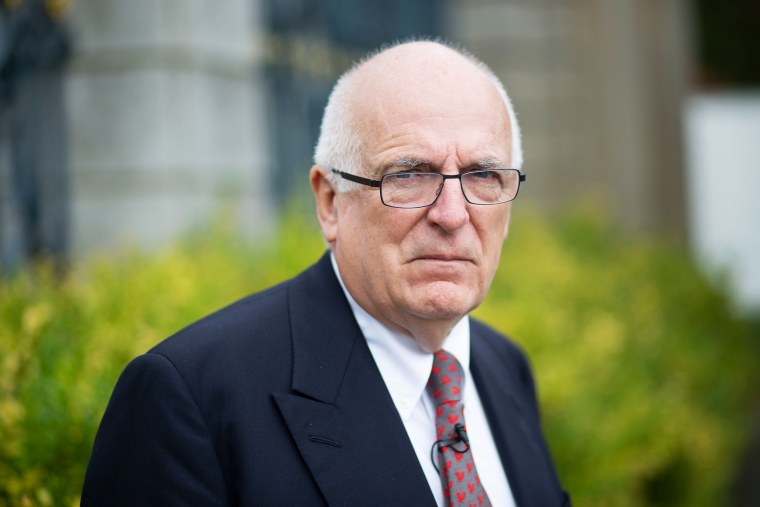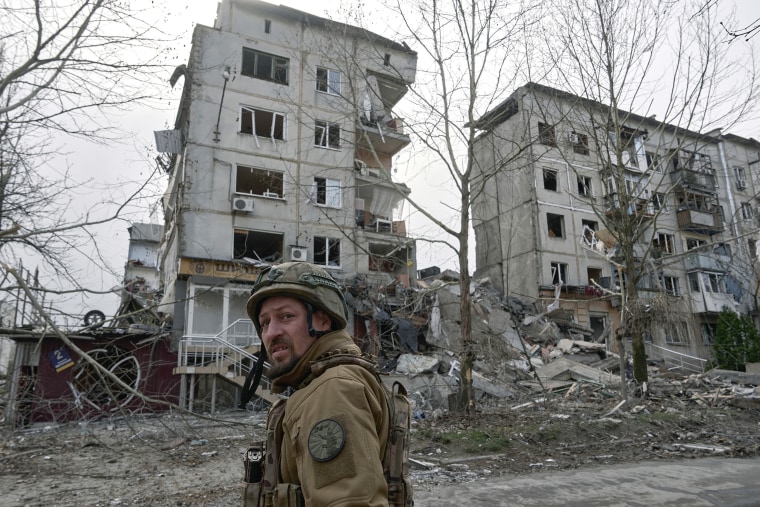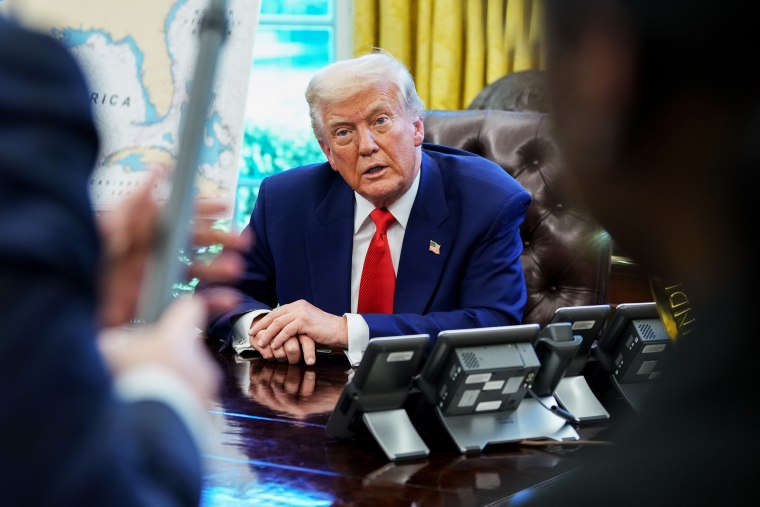LONDON — If President Donald Trump wants a Nobel Peace Prize, he should hold off negotiating a ceasefire between Ukraine and Russia, Britain’s former top spy told NBC News on Thursday.
Richard Dearlove, the ex-head of British intelligence agency MI6, said that rushing a truce — and giving too many concessions to the Kremlin — could encourage President Vladimir Putin to launch other hostile forays into Europe.
The Russians badly need a ceasefire, said Dearlove, citing waning Kremlin cash reserves and the falling price of crude oil, which Moscow exports to fund its war machine.
“Ukraine is pretty close to a tipping point,” he said in a wide-ranging interview. “But the worry at the moment is that Trump will do a premature deal with the Russians” and make too many concessions.

The “highly undesirable” consequences would be to “embolden the Russians, over time, to be more aggressive and assertive in Europe,” said Dearlove over a coffee at one of London’s historic private members clubs.
His remarks come as Ukraine’s military chief said Russia had launched a new offensive in the Eastern European country.
While often less critical of Trump’s unorthodox approach than many other foreign policy experts, Dearlove said he finds Trump’s general “lack of grace” and “lack of decent behavior” to be “very disconcerting” — specifically his Oval Office bust-up with Ukrainian President Volodymyr Zelenskyy in February.
“My general view of Americans is they’re gracious and they behave very respectfully,” said a gently amused Dearlove, 80, an Olympic rower’s son who spent a year at Connecticut’s preparatory Kent School before gaining his degree back in Britain at the University of Cambridge. “It’s extraordinary the way that Trump has blown up all of that.”
The jovial, outspoken grandee of the British foreign policy establishment joined MI6 in 1966 and served as its chief — code-named “C” — between 1999 and 2004. He now co-hosts the “One Decision” podcast, covering global news, alongside former U.S. Defense Secretary Leon Panetta.
He says he “strongly supports” the American president’s campaign to pressure European allies to spend more on defense, decrying the imbalance of Europe enjoying a relatively generous health care and benefits system while letting the U.S. foot the bill for Western defense.
“Why should American taxpayers pay for indulgent social security programs in countries like Germany, France and Italy?” he said.

He dismisses “Signalgate” — in which Trump’s team discussed bombing Yemen on the messaging app Signal — as a “stupid” and “silly mistake” that showed “a degree of amateurism.” And he said it wouldn’t have a long-term impact on Western intelligence sharing.
Reached for comment on Dearlove’s remarks, White House principal deputy press secretary Harrison Fields said, “President Trump is a master negotiator who has done more to bring about world peace during his tenure than any president in modern history.”
“The President’s Peace Through Strength agenda has delivered historic achievements across the globe and restored American dominance on the world stage,” Fields added. “The ‘experts’ have been wrong for decades, and doing the same thing while expecting a different result is the definition of insanity.”
The ex-MI6 head says his biggest short-term worry revolves around Trump’s approach to Ukraine, which has involved parallel talks with both Kyiv and Moscow and has been lambasted by Trump’s critics in the West as being too favorable to the latter.
“If you want to get the Nobel Peace Prize, don’t do a premature deal with Ukraine — wait,” Dearlove said. (According to former aides, the president still covets the landmark award won by four of his predecessors, and for which Trump has been nominated at least twice before.)
Dearlove believes the Russians are on the back foot and will only come under more pressure to accept terms. “The Russians themselves badly need a ceasefire, but Putin is incapable of seeking one because he “doesn’t have a reverse gear,” Dearlove said.
On Iran, responding to Trump’s announcement that the U.S. will hold direct talks with Tehran over its nuclear program, Dearlove says he believes the administration will “demand a very high price” — namely that Iran give up its entire nuclear program, both for energy and weapons.

“I think there’s a bottom line for Trump and Israel that Iran must not have nuclear capability,” he said. “I think it’s pretty clear that if Iran were to try to weaponize or if the intelligence suggests that they are weaponized, then there would be a joint Israeli-American attack.”
Trump didn’t rule out military action if the talks don’t succeed, saying Tehran would have a “very bad day” if diplomacy failed.
Dearlove agreed: “If the Iranians don’t negotiate, or if they mislead, which they’re quite capable of doing, they’re ones heading for a crisis.”
Dearlove was head of MI6 when the U.S. invaded Iraq in 2003, and was later criticized by a public inquiry for his handling of intelligence alleging that Saddam Hussein had weapons of mass destruction, a key argument steering Britain into the war alongside Washington. At the inquiry in 2017, he described claims he was too close to the British government as “complete rubbish.” And, according to a BBC interview in 2023, he is among a minority of people who believe that Iraq did have some kind of weapons program, but that its components may have been moved into neighboring Syria.
Looking ahead, Dearlove believes by far the biggest issue is how the West deals with China.
“Pax Americana” — the “American peace” that has largely held since 1945 and is a byword for Washington’s postwar global dominance — has “definitively disintegrated,” he said. In its stead, there has to be “some sort of understanding between the United States and China,” whose President Xi Jinping “wants to create a world by 2050 which is aligned with China’s value system,” he added.
“China and the West are intimately intertwined: You can’t take them apart, you can’t disentangle them,” he said. “But at the same time, it’s totally opposed to the Western value system.”
He characterizes Xi’s Chinese Communist Party as “talking about global domination” — something vehemently rejected by Beijing.
“There’s going to have to be some sort of international agreement which accommodates what I would describe as the two spheres of influence,” he said. Otherwise, China is “going to end up in a confrontation with the United States at some point in the 21st century.”
